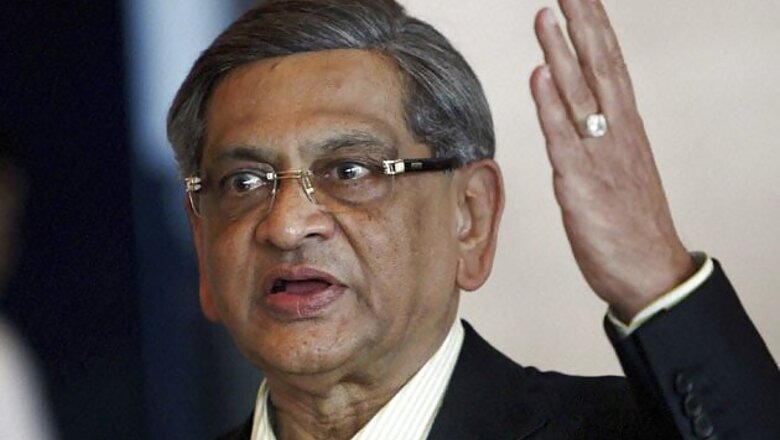
views
Washington: External affairs minister SM Krishna on June 12 sought to reassure frustrated US business leaders that India is committed to economic reforms after recent government decisions that have left them questioning future investments.
"In an era of global interdependence, not everything is within the powers of national governments. But we are confident we will restore investor confidence and regain momentum and growth," Krishna said in a speech ahead of a meeting on June 13 with US Secretary of State Hillary Clinton.
Regulatory uncertainty and policy gridlock have battered foreign corporate sentiment towards India, adding to a dramatic slowdown in the Asia democracy's economic growth and exacerbating a widening current account deficit that has knocked the rupee to record lows.
India's industrial output growth flatlined in April, piling pressure on policymakers to take action to revive the economic fortunes of a country that Standard & Poor's warned could be downgraded to junk status because of political inaction.
Speaking just before Krishna, White House international affairs adviser Michael Froman said US companies have grown increasingly "concerned about the economic relationship, fearing that the investment environment has deteriorated, that domestic political challenges are slowly the pace of reforms."
He urged Prime Minister Manmohan Singh to recommit to economic reforms and market opening "as the best way to assure our bilateral relationship continues to deepen and broaden and the best way to ensure that India's place as an emerging power remains secure."
In recent months, global business groups have raised concerns that new Indian policies on technology purchases would unfairly discriminate against foreign firms.
Proposed changes in Indian tax provisions have also sparked criticism and warnings that investment plans by overseas companies could be reconsidered. New Delhi has also backtracked on plans to open its market to big multi-brand retailers like Wal-Mart.
The "disturbing flip flops and increasing signs of an absence of predictable investment and business climate ... are hampering India's progress and scaring away foreign investment," Ajay Banga, new chairman of the US-India Business Council and CEO of MasterCard Worldwide, said in a speech.
Krishna told the business group that India has gone through previous periods "where the growth seemed to lose its steam and the agenda of reform seemed to be slowing down."
"But time and again, our economy rebounded with new vigors on the strength of strong fundamentals and supported by sound policies and prudent economic management," he said.
The veteran politician said he was confident that would happen again because "virtually every party in India has been at some point part of the reform process itself."
Krishna stressed the importance to Indian economic growth of an "open and growing market" in the United States.
He also urged the Obama administration, which on Monday exempted New Delhi from sanctions on Iran's oil trade, to clear the way for India to import natural gas from the United States.
Despite current strains in the relationship, Ron Somers, president of the US-India Business Council, said he hoped the two countries could finish ongoing talks on a Bilateral Investment Treaty(BIT) by the end of the year.
That would provide certain safeguards for business investors and a forum for resolving investment spats.
The business group also wants the two governments to begin talks on a free trade agreement, once the BIT is reached.
"That would be a real game-changer," Banga said.
The Peterson Institute for International Economics has been commissioned to explore the potential benefits of a free trade pact. The study is expected to be done by early 2013, in time for the next US administration, whether led by President Barack Obama or his Republican challenger Mitt Romney, to take up the initiative, Somers said.




















Comments
0 comment